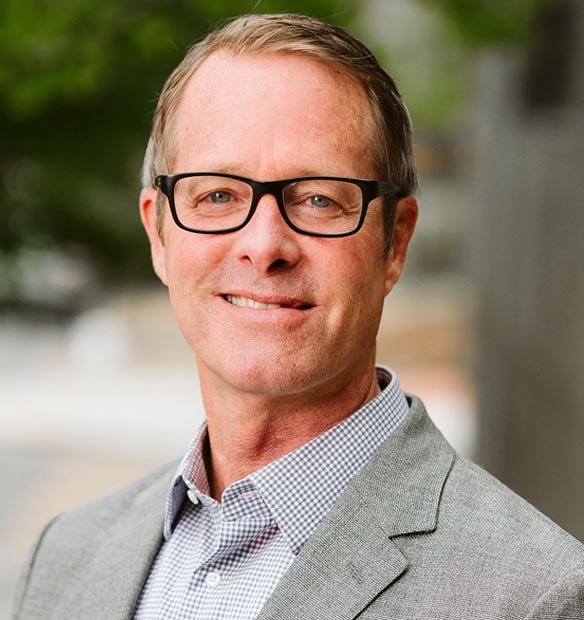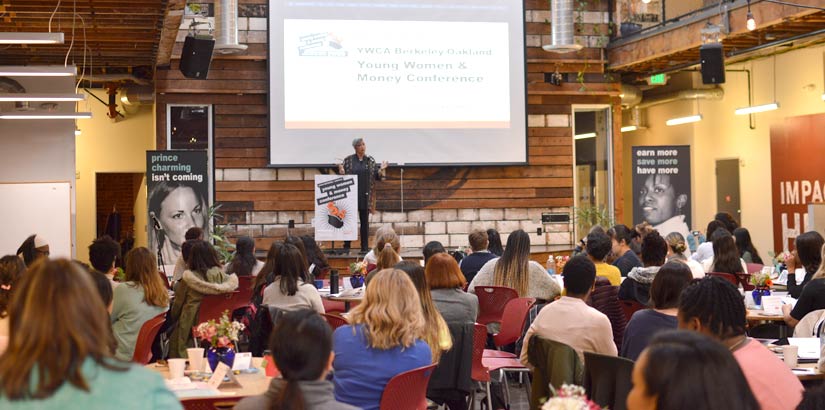Community Partner Highlight: YWCA Berkeley/Oakland
“Our hope for the [Young Women and Money] conference is that each person walks away with a vision of themselves and that they’re able to connect with the concept of what’s possible.”
Freda Statom-Greene, Executive Director, YWCA Berkeley/Oakland
Personal finance, the way in which we interact with money, is a complicated issue for many people. Limited educational opportunities and taboos about discussing money have contributed to a financial literacy rate of only 57% in the US.1 This means that many adults in America struggle with budgeting, saving, investing, and retirement decisions, mainly because they were never offered the skills within their family or at school. As with so many challenges in our society, where there are holes in the system, community organizations develop innovative ways to fill the voids.
For the past 15 years, the YWCA Berkeley/Oakland has held its Young Women and Money Conference to create financial learning opportunities and promote financial literacy. The YWCA has a long history of empowering women* by developing leaders, advocating for women’s rights, and fighting for racial and gender equality. This conference supports their mission by following a simple principle: Teach someone how to manage their finances at an early age and they are less likely to experience financial pitfalls later in life. This empowers the individual and builds a more just and resilient community.
At North Berkeley Wealth, we see the YWCA’s work on financial literacy as a vital component to creating a community alive with connection and stewardship. The groundwork they’ve laid has created more equitable participation in our community and developed young leaders with deeper financial knowledge. We’re proud to work with them as a community partner and want to share their story as financial literacy advocates.
A History of Empowerment
The YWCA Berkeley/Oakland was founded on the UC Berkeley campus in 1889 by seventeen women focused on community service and leadership training. It exists as part of an expansive national and international organization that began in the mid-1800s in England. Within this structure, each YWCA retains the ability to focus on its immediate community, with the parent organization having the ability to address issues in a broader context. Over the past 134 years, the YWCA Berkeley/Oakland has risen to address the social needs of the time, while staying true to a core mission of eliminating racism and empowering women.
The YWCA Berkeley/Oakland has been a strong advocate for equality and justice. This has required an evolution to meet the changing social issues, especially since the social awakening of the 1960s. Today’s YWCA is driven forward by dedicated staff, volunteers, and an active board to support a mission of eliminating racism, empowering women, developing leaders, and promoting peace, justice, freedom, and dignity for all. This expanded perspective is evident in their current programming, which embraces a broad group of people, building on the idea that inclusiveness leads to a stronger community. Nowhere is equal footing more necessary than financial knowledge, and that is the impetus behind the conference, which was launched 15 years ago.
Young Women and Money Conference
The conference brings together a group of young women, volunteers, and presenters to discuss personal finance issues such as credit, investing, day-to-day budgeting, and retirement planning. It is meant to be a safe place for people of all racial and economic backgrounds to openly discuss financial matters. Freda Statom-Greene, the YWCA’s Executive Director, emphasized that “financial literacy is always going to be a strong element of what we do, particularly as we talk about being prepared for opportunities. We focus on developing young women and making sure that they are prepared for the workforce, and for being engaged citizens in the community because we believe in the collective power of the community.”
Over the course of a day, attendees choose between various workshops, focusing on the issues that meet them where they are in their financial journey, from the person wanting to know how to create a budget to someone who is ready to invest. Beyond gaining financial knowledge, they see the conference as a way for people to learn how to network; both being vital skills throughout life. The hope for the YWCA team, Marilyn Cleveland, Board President, says, “is that each person leaves with new skills and new objectives that are measurable.” Statom-Greene adds, “and that each person walks away with a vision for themselves. And that they connect to the concept of what’s possible and learn from the other women in the group and build connections.”
It’s not only individuals that benefit from financial literacy. There is also a social justice component for the YWCA. Marilyn Cleveland says, “our conference really focuses on the intersection of eliminating racism and the empowerment of women because a large number of attendees are BIPOC women from lower-income communities.” By hosting the conference, they hope to change the lives of people who would not have otherwise had the opportunity. The empowerment of one person, especially from an underserved group, can ripple outward with benefits for family members, future generations, and their broader community.
A Community of Partners
There is a need in our communities, at the local and national level, for a deeper commitment to personal finance education. Traditional avenues of education haven’t provided the necessary instruction and support regarding the practicalities of managing our money. We applaud the work of the YWCA in filling these gaps through their mission and programming. We’ve been lucky enough to partner with them over the last few years, and we are the lead sponsor of the conference this year. Several of our advisors, including Krystal Fortner, Jena Regan and Carmetta Joyner have presented in the past, and this year Ariana Alisjahbana will be presenting a talk on Investing 101.
We hope you take the opportunity to learn more about the work of the YWCA. For more information about the Young Women and Money Conference and the YWCA Berkeley/Oakland, please visit their website ywca-berkeley.org.
Resources
1 “Financial Literacy in the United States,” Milken Institute
*The YWCA’s use of “girls” and “women” is inclusive of all cis and trans women, non-binary, gender non-conforming, gender queer, and any female-identified people. YWCA Berkeley/Oakland
 | About James WilsonJames Wilson serves as our Director of Client Experience and curator of our art gallery. He is responsible for building and maintaining the North Berkeley brand, strengthening relationships with community partners, and working with prospective clients. |
This commentary on this website reflects the personal opinions, viewpoints, and analyses of the North Berkeley Wealth Management (“North Berkeley”) employees providing such comments, and should not be regarded as a description of advisory services provided by North Berkeley or performance returns of any North Berkeley client. The views reflected in the commentary are subject to change at any time without notice. Nothing on this website constitutes investment advice, performance data, or any recommendation that any particular security, portfolio of securities, transaction, or investment strategy is suitable for any specific person. Any mention of a particular security and related performance data is not a recommendation to buy or sell that security. North Berkeley manages its clients’ accounts using a variety of investment techniques and strategies, which are not necessarily discussed in the commentary. Investments in securities involve the risk of loss. Past performance is no guarantee of future results.



